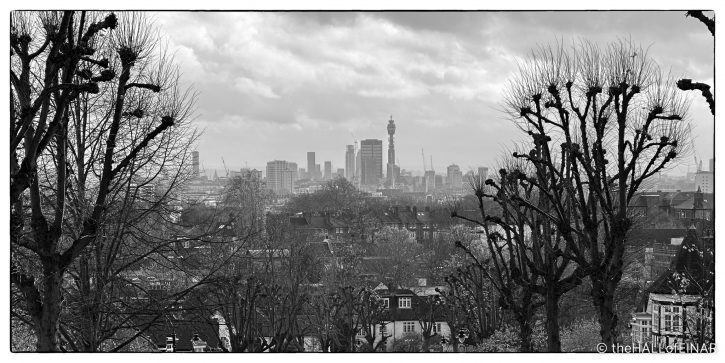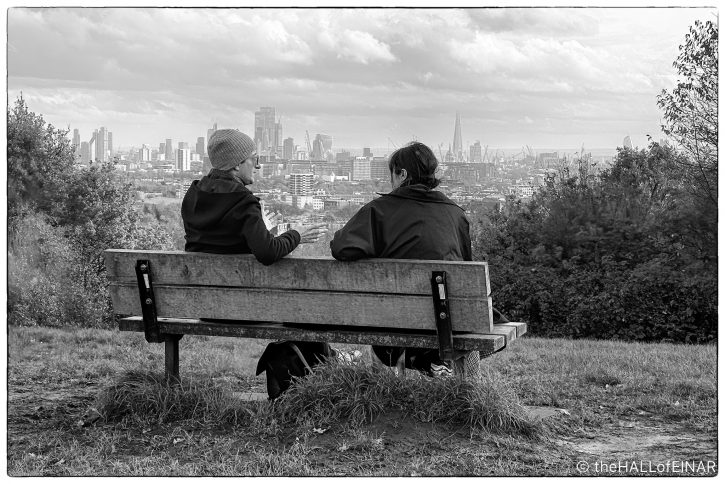Three Old Women

I’ve always wanted to go to Hampstead Heath. No, not because it’s the busiest gay cruising site in the UK, possibly the world. Because of highwaymen and poetry. The Spaniards Arms in Hampstead was highwayman Dick Turpin’s local pub and his dad was the landlord. More about my obsession with highwaymen later. Hampstead Heath is also the scene of a poem in a book I bought as a teenager. I spent many happy hours cycling to second-hand bookshops and picking up obscure books for a few pence. Many were books of traditional British ballads. A few were poetry. One was Collected Poems by Conrad Bonacina from 1957. It’s a limited edition of 500 copies, but sadly mine isn’t one of the 100 which were signed. Conrad was a translator and worked for The People and Freedom Group, a political movement which failed in Britain, which is why there’s no Christian Democratic Party in Great Britain yet there are throughout Europe.
As I climbed to a seat at the top of Hampstead Heath I thought about this poem, which is set there.
Three Old Women
Three old women whose drab sour faces
Mirrored age without the graces
Age preserves in some old faces
Climbed to a seat on Hampstead Heath
Close to the friendly oak beneath
Whose shade I lay peacefully reading
My favourite Virgil; paused to get breath,
Then perched them down, and me unheeding
(Half-hid nearby in a deck-chair reading),
Nor caring aught for the passionate pleading
Of fate-stricken Dido, opened their bills
And went on croaking about the ills
Their foul anatomies were breeding . . .
‘Yes,’ croaked the first, ‘that Doctor Slaughter
“Examined me proper, ‘e did, ‘e sez
‘Me inside wants scrapin’, trouble is
‘I can’t get rid o’ what I oughter …’
(Ah constipation! Discussion thrives –
Exchange of views on purgatives.)
Dropsical Two had been neglected
‘Shameful,’ I gathered, by her daughter,
‘And me so helpless with all this water
‘Swellin’ me up and me ‘eart affected,
‘As I sez to my neighbour Mrs’ – drowned
In roar of airplanes wheeling round.
Three, whose voice was muffled in
The rolls of fat beneath her chin,
Was full of boils and odd reflections
Upon the causes of blood infections:
Suffered too from ‘ me old complaint,
‘Piles, dear, something dreadful, I ain’t
‘Slep’ for a weck, and them injections
‘They give me up at the orspital, don’t
‘’ave no effek’ – ‘ No more they won’t’
Snorted the stomach that wanted scrapin’;
‘There ain’t no cure for piles exceptin’
‘The knife; you ‘ave ’em cut out, my dear,
‘Same as what my old man did! … (Here
Further discussion between the three
On haemorrhoids and surgery.) …
So this, I thought, as I moved my chair
A little away to wholesomer air,
Is what the hurrying years portend
For us poor mortals at journey’s end:
Bodies diseased, and hospital faces,
And minds as sour as their cankered cases;
Bluebottle minds that settle and feed
On the ills their rotting bodies breed –
God, what a doom to look forward to! …
I took up my Virgil and tried to read:
‘Taedet coeli convexa tueri . . .
No use. Infelix Dido grew
Into the dreary shapes life-weary
Of those poor desolate creatures there,
Three old women whose ugly faces
Mocked the notion that life could ever
Have flowered its season of youthful graces
In such unsavoury dwelling-places.
Yet once they too were young and fair!
Once those old crones (incredible thought)
Had smiled on life with fresh young faces
And stirred men’s hearts and been besought
Like goddesses for their embraces! . . .
We mourn the tragic fate of those
Who pass ere time has blown their rose;
But what of those who the bloom outstay,
Who watch the petals falling away
In the mouldering process of life’s decay?
Infelix Dido? At least she died
‘Pulcherrima’ in her beauty’s pride,
At least she was spared the piteous fate
Of those whom the years disintegrate,
I mused, as I pictured the lonely doom
That awaits old age in its chambered gloom.
Three old women with hospital faces
Sniffing life’s dregs with sour grimaces…
Nearing voices and shuffling feet
Broke on my musings. I glanced at the seat –
Yes, they were going at last, thank God.
And as they went by, I thought what an odd
Gloss they’d inserted in Dido’s sighs,
And may be I smiled, for to my surprise
They met my glance with a friendly nod,
Each face transfigured by smiling eyes;
And one of them, she with the double chin,
Remarked what a lovely day it had bin,
And the look in her eyes was so gentle and kind
It warmed my heart and shamed my mind.
I blurted such words as speech could find,
But my heart was framing a humble plea
Of forgiveness to those women three,
Whom my thoughts had mocked with such barren glee.
And as I watched them descending there
To their lonely homes in God knows where,
I blessed them each with a silent prayer –
Three old women whose tired sad faces
Still revealed the hallowed graces
That witness God in human faces . . .
***
I don’t enjoy it now the way I did as a teenager. Describing women as ‘drab’, ‘sour’, ‘croaking’, ‘dreary’, ‘desolate’, ‘ugly’, and as ‘crones’ with ‘foul anatomies’ and ‘rotting bodies’ is the height of misogyny. Do you think he redeems himself with his final plea for forgiveness and profession of faith? I’m not convinced.
Here’s the view from the seat at the top. I think it’s changed a bit since the 1730s, when Dick Turpin terrorised the neighbourhood, and it’s also been transformed since the 1950s when Conrad Bonacina published the poem.

I wanted to get a photograph of three old women sitting on the bench, but I’m not sure how much they’d want to be associated with the poem, and I didn’t have all day to wait on the off chance that three arrived.
Later that evening, I’m watching TV when I realise this is the exact spot the current EE advert with Kevin Bacon was filmed.